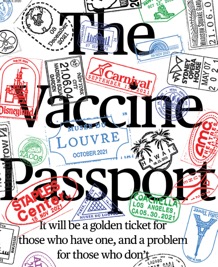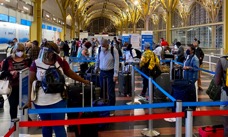 A year has passed since the COVID-19 pandemic began, and the effect it has had on the travel industry is enormous. According to the United Nations World Tourism Organization, international arrivals in 2020 decreased 73% and resulted in a loss of $1.3 trillion in export revenue. Leisure travel in 2020 was down 63% compared to 2019, where business travel was down 83%. Nevertheless, the most affected industry in travel has been the cruise lines, as they have been shut down since the beginning the pandemic.
A year has passed since the COVID-19 pandemic began, and the effect it has had on the travel industry is enormous. According to the United Nations World Tourism Organization, international arrivals in 2020 decreased 73% and resulted in a loss of $1.3 trillion in export revenue. Leisure travel in 2020 was down 63% compared to 2019, where business travel was down 83%. Nevertheless, the most affected industry in travel has been the cruise lines, as they have been shut down since the beginning the pandemic.
Despite this, there is a light at the end of the tunnel for the travel industry, the COVID-19 vaccine. At the start of February 2021, the federal and state governments in the United States developed a phased system guide for administering the vaccine. Shortly after, the idea of vaccine passports has been suggested for domestic and international travels to alleviate and produce revenue for the travel industry.
What are Vaccine Passports? A vaccine passport is a digital passport implemented in a mobile application to show a record of the person’s vaccination against COVID-19. Additionally, the application will also allow the person to check entry requirements for a country and hold the COVID-19 test results and other health information in a portal. As Bloomberg suggests, if this vaccine passport is established in the travel sector, the vaccine passport could “hold the key to the reopening of wider society, advocates say, allowing business meetings and conventions as well as gatherings at sports events and concerts.”
Several administrations throughout the world have begun to implement development of such vaccine passports. The Biden administration issued an executive order in January “directing agencies to assess the feasibility of linking coronavirus vaccinations to vaccine cards, also known as ‘international certificates of vaccination or prophylaxis,’ and producing a digital version.” Additionally, the United Kingdom government has heavily considered implementing a similar strategy for vaccine passports. Likewise, the European Union has announced that it would release digital certificates for the vaccine proved to allow for summer travel. Similarly, a digital COVID-19 vaccine passport has been announced by Bahrain, Denmark, Sweden, and Iceland.
The travel industry has been excited about the possibilities to open up with this new initiative of vaccine passports. The advocates in favor of the vaccine passports believe it will bring a sense of normalcy, encouraging people to get vaccinated, which in the long run will reduce the COVID-19 transmission and eventually allow countries to reopen their economies fully. The travel industry hopes that the vaccine passports will allow certain countries to drop some COVID-19 restrictions that have been in place, such as quarantine periods and COVID-19 tests.
 Alternatively, critiques of the vaccine passports point out that there are issues involving privacy concerns, civil liberty violations, confusion to the consumers due to several applications, and the effectiveness of the COVID-19 vaccines. There have been several versions of the COVID-19 vaccine that have been administered around the world by countries, and it is unknown which vaccine would be approved by each country for international travel. Additionally, the vaccine shots which have been administered are not 100% effective, and travelers with vaccine passport could, in theory, continue to spread the virus in crowded places. The fear by the critiques is that the vaccine passports could be a false sense of security. Furthermore, several countries and airlines have been developing these vaccine passports, and the consumer might be confused by having to upload their vaccination record multiple times. Thus, mandating vaccination passports to travel can violate civil liberties, since it can be deemed unconstitutional for the private sector government to impose such requirement.
Alternatively, critiques of the vaccine passports point out that there are issues involving privacy concerns, civil liberty violations, confusion to the consumers due to several applications, and the effectiveness of the COVID-19 vaccines. There have been several versions of the COVID-19 vaccine that have been administered around the world by countries, and it is unknown which vaccine would be approved by each country for international travel. Additionally, the vaccine shots which have been administered are not 100% effective, and travelers with vaccine passport could, in theory, continue to spread the virus in crowded places. The fear by the critiques is that the vaccine passports could be a false sense of security. Furthermore, several countries and airlines have been developing these vaccine passports, and the consumer might be confused by having to upload their vaccination record multiple times. Thus, mandating vaccination passports to travel can violate civil liberties, since it can be deemed unconstitutional for the private sector government to impose such requirement.
Overall, the vaccination passport is not a novel concept discussed by many countries, and it could be effective to help out the travel industry and economy. Nonetheless, the primary warning that follows the vaccine administration and the vaccine passports is that social distancing and mask-wearing are still essential in these early stages of COVID-19 vaccinations.



 A year has passed since the COVID-19 pandemic began, and the effect it has had on the travel industry is enormous. According to the United Nations World Tourism Organization, international arrivals in 2020
A year has passed since the COVID-19 pandemic began, and the effect it has had on the travel industry is enormous. According to the United Nations World Tourism Organization, international arrivals in 2020 
 Alternatively, critiques of the vaccine passports point out that there are issues involving privacy concerns, civil liberty violations, confusion to the consumers due to several applications, and the effectiveness of the COVID-19 vaccines. There have been several versions of the COVID-19 vaccine that have been administered around the world by countries, and it is unknown which vaccine would be approved by each country for international travel. Additionally, the vaccine shots which have been administered are not 100% effective, and travelers with vaccine passport could, in theory, continue to spread the virus in crowded places. The fear by the critiques is that the vaccine passports could be a false sense of security. Furthermore, several countries and airlines have been developing these vaccine passports, and the consumer might be confused by having to upload their vaccination record multiple times. Thus, mandating vaccination passports to travel can violate civil liberties, since it can be deemed unconstitutional for the private sector government to impose such requirement.
Alternatively, critiques of the vaccine passports point out that there are issues involving privacy concerns, civil liberty violations, confusion to the consumers due to several applications, and the effectiveness of the COVID-19 vaccines. There have been several versions of the COVID-19 vaccine that have been administered around the world by countries, and it is unknown which vaccine would be approved by each country for international travel. Additionally, the vaccine shots which have been administered are not 100% effective, and travelers with vaccine passport could, in theory, continue to spread the virus in crowded places. The fear by the critiques is that the vaccine passports could be a false sense of security. Furthermore, several countries and airlines have been developing these vaccine passports, and the consumer might be confused by having to upload their vaccination record multiple times. Thus, mandating vaccination passports to travel can violate civil liberties, since it can be deemed unconstitutional for the private sector government to impose such requirement.